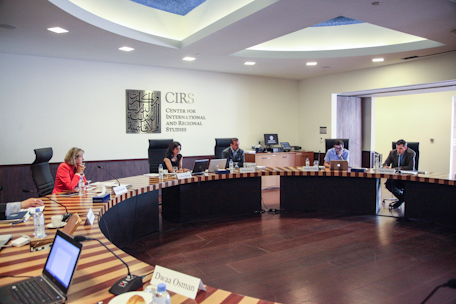Focused Discussions, Regional Studies
The Evolution of Gulf Global Cities Working Group II

On April 12-13, 2014, CIRS held the final Working Group of “The Evolution of Gulf Global Cities” research initiative. Academics from various disciplinary backgrounds as well as architects, urban planners and designers gathered for the second meeting to discuss their research findings and papers around the theme of Gulf cities. The topics discussed ranged in their geographic coverage of the Persian Gulf and in their temporal analysis extending back to the early-twentieth century until the present-day. Elements of continuity and change in the urban landscape were discussed against the political, cultural and historical backdrop of the Gulf region.
Rapid urbanization and rising skylines have invigorated academic focus on cities of the Gulf. Opening the discussion, participants questioned the way in which Gulf cities are discussed in a highly depoliticized manner within popular discourse. Gulf cities are categorically described as transnational and global cities that are also “prosperous, modern and stable in a larger, more volatile and impoverished region”—how do these depictions diffuse images of the Gulf that constitute a certain ideological substrate? Discussants problematized the category of “city” itself, and pushed their analysis further to incorporate more socially and politically nuanced understandings of space. For instance, how do non-citizens live and fit within the space of the city? How do construction workers who help build the city find their place in these spaces that are generally depicted as transnational and metropolitan yet are highly segregated and limit the mobility of a cohort of its inhabitants? These are all questions that reflect on the current unspoken discursive formations of cities in the Gulf – formations that define ‘cities’ based on narrow and depoliticized interpretations.
While the current depictions of Gulf cities as “transnational” and “global” assume a historical break and disjuncture with urban characteristics of the pre-oil Gulf, participants discussed forms of transnational urbanism that were present in the early twentieth-century port cities. With its vast global networks, the region has always exhibited elements of transnationalism—however, its urban forms have also historically exhibited a privileging of homogeneity and unity of identity and class; a privileging that has led to the control and a morphological segregation and separation of difference. Looking at pluralism within the historical evolution of Gulf cities indicates that while they may have always been transnational, they have not been equally cosmopolitan.
Giving historical context to these spaces, Working Group members discussed linkages between territory, territoriality, infrastructure, and nation-building in the Gulf. In the case of the UAE, infrastructure played a central role during the country’s transformation from an itinerant territory to a fixed one based on oil extraction and subsequently on real estate development. A tool utilized for developing territory, infrastructure was also utilized by the political rulers as a nation-building medium that formed the essence of Emirati discourses on development, its modern territorial order, and ultimately the order of the state. Current major real-estate developers in the UAE—particularly in Dubai—continue to be under the basic control and power of the Emirati rulers, highlighting real-estate’s distinctive role vis-à-vis the state in promoting economic growth and reinventing the identity of the city.
While oil and gas revenues have heavily financed infrastructural developments and mega-projects in the Gulf, recent strides to lay the post-oil era foundation and to develop knowledge-based economies have also influenced their urban fabric. The proliferation of “smart cities,” cities within cities, free trade zones, mixed-use projects and tourism projects are indicative of this transition. Despite rapid urban development, pockets of historical traditional neighborhoods continue to exist in the Gulf. These spaces provide meaningful insight into the sentiments of residents and their emotional attachment and belonging to place in the midst of the proliferating presence of gated compounds and large houses encapsulated by tall fences. Place identity is a central component of residential satisfaction and as a case-study of traditional neighborhoods in Muscat reveals, the sense of community that residents ascribe to a place is what gives place meaning. Efforts to reconstruct and rehabilitate traditional neighborhoods around the Gulf—such as Msheireb in Doha, which envisions bringing the heart of the city back to its roots—in fact risk losing “place-meaning,” by practicing “place-making” and commoditizing the “traditional.” Across the Gulf, stressed or “decaying fabrics” of historical areas in Bandar-Abbas experiencing physical and economic decline have expanded throughout the city. While the government has housing plans to renovate these areas, low-income residents will most likely be pushed to the fringes of the city—exacerbating the “informalization” of their settlements and limiting their right to the city.
- Read the participant bios
- See the working group schedule
- Read more about this research initiative
Participants and Discussants:
- Pooya Alaedini, University of Tehran
- Zahra Babar, CIRS – Georgetown University School of Foreign Service in Qatar
- Marike Bontenbal, German University of Technology in Oman
- Matt Buehler, CIRS – Georgetown University School of Foreign Service in Qatar
- Nerida Child Dimasi, CIRS – Georgetown University School of Foreign Service in Qatar
- Remah Gharib, Qatar Faculty of Islamic Studies
- Barb Gillis, CIRS – Georgetown University School of Foreign Service in Qatar
- Mehran Kamrava, CIRS – Georgetown University School of Foreign Service in Qatar
- Ahmed Kanna, University of the Pacific
- Arang Keshavarzian, New York University
- Suzi Mirgani, CIRS – Georgetown University School of Foreign Service in Qatar
- Dwaa Osman, CIRS – Georgetown University School of Foreign Service in Qatar
- Stephen J. Ramos, University of Georgia
- Ashraf M. Salama, Qatar University
- Evren Tok, Qatar Faculty of Islamic Studies
- Elizabeth Wanucha, CIRS – Georgetown University School of Foreign Service in Qatar
- Florian Wiedmann, Wiedmann Mirincheva Associates
Article by Dwaa Osman, Research Analyst at CIRS